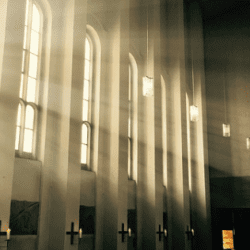A conversation has been developing across the Patheos Evangelical Channel regarding soteriology (that is, the study of salvation). Frank Viola re-posted some history on the Sinner’s Prayer and talk of Christ as one’s “personal Lord and Savior,” tracing its origins back to the revivalist D. L. Moody. Viola urged that, before Moody, Christians didn’t use the language of asking Jesus into one’s heart or uttering a particular formula of prayer in order to receive salvation. Preston Sprinkle analyzed a similar concept: having a “personal relationship with Jesus.” He too found the idea novel and unbiblical. Meanwhile, Roger Olson has been writing a series entitled, “Is a carnal Christian saved?” I highly recommend reading the posts here, here, and here.
Basically, many of us on the Evangelical channel are asking questions about how one knows he is a Christian. While we all agree that salvation is accomplished by Christ’s life, death, and resurrection on our behalf, we wonder when this is applied to the Christian. This is an important set of questions with tremendous practical implications. As such, I’d like to throw my own theological hat into the ring of discussion.
I agree with Preston and Frank the mark-off point for salvation is not necessarily the Sinner’s Prayer, nor do I believe that salvation is an individualistic, “Hell-fire insurance” affair. We’re talking about when Christ’s salvific grace from His work gets applied to us; we’re timing the start of our new life in Him (i.e. regeneration). Are the conversion experience and confession of faith the time when we can and must all say, “You are now a Christian”? I think that Roger the Baptist and Frank the Anabaptist would certainly say that, as would probably Preston. It is the core assumption of American credobaptist theology: conversion marks the point of regeneration. Because of that, one should not become a member of the church officially until he can make his confession of repentance from sin and of faith in Christ (because the church is made up of the covenant people of God, who are by definition recognized as regenerate). We must do our best to keep the tares out of the wheat in the assembled congregation of God’s people.
But what do we do with backsliders? And what happened before the conversion experience? This is where the Arminians and Calvinists go back and forth with one another in Baptist circles. The Reformed put an emphasis on the perseverance of the saints: once saved, always saved. Thus, those backsliders either were never regenerated to begin with OR they are still saved, despite their Antinomianism (active rejection of the Law). Arminians are more open to saying that, for a while, a backslider was saved, but he can freely spurn and reject the love of God, thus changing his state.
Therefore, we see a lot of hand-wringing about the “security” of one’s salvation. And, while we have much argument back and forth on predestination and free will, there’s an understanding that the point of belief is what sets one apart from the world as a Christian.
This is the common outline of the conversation we have these days in many circles. But it didn’t spring out of nothing. And it rejects the theology behind paedobaptism (those who baptize babies), which was the overwhelmingly accepted view for most of the Church’s history. In fact, this conversation only exists because dissenting Protestants and Anabaptists had to form an alternative soteriology when they rejected the doctrine of baptismal regeneration. When I assert this, I am disagreeing with Frank a bit: the dysfunctional history is longer and deeper than D. L. Moody.
Before this argument, Christians assumed that baptism was the point where one was regenerated. The sacrament gives the grace of rebirth. It is, in the language of the 39 Articles, an “effectual sign.”
Well, if one rejects such a sacramental theology, what does he do now? He’s now asking faith to work in a way it had never been understood to work before (we’ll address this in another post). Let’s start with the Reformed camp, especially the Puritans and the early credobaptists since they start off on a quest to reformulate the theology of salvation along “purer” and “more biblical” lines.
Puritans locate the point of salvation in God’s Will and Decree—quite the objective view. When does that “kick in?” If Baptism doesn’t mark off the beginning of the Christian regenerated new life, what does? Lots of debate goes back and forth (we lack the space to cover many individual thinkers and the great nuance of the arguments). In the buildup before and during the First and Second Great Awakenings, this controversy became a real sore spot.
The “New Lights” of the First Great Awakening call for mass repentance. Lukewarm “Christians” were “faking” Christianity. They obviously didn’t have the Holy Spirit. Revivalists like Jonathan Edwards, George Whitefield, and (to a greater extent in England) the Wesley brothers called for crowds to put their faith in Christ rather than have an overly-comfortable reliance on one’s baptism. Edwards especially put an emphasis on what he called the “religious affections,” which are awakened by the Holy Spirit and are a sure indicator of a Christian’s regeneration. As a result, there’s an inward turn to analyze and brood upon one’s motives and feelings. If you think this a small thing, you should definitely think again. It leads to a titanic shift in expectations for the Christian life.
The trajectory from the First to the Second Great Awakening of Charles Finney was fairly straightforward. Finney simply emphasized more on the subjective side of salvation: when the person puts their faith in Christ rather than when God acts upon the person. Thus, you see the emotive appeals and the anxious benches where enthusiastic revivalists demand audience members to make a “decision for Christ” in order to be saved. And it doesn’t take too much work to see how credobaptism fits best with this logic.
For lack of a better word, the salvation decision has become a new sacrament—one the Church would have never recognized as such in earlier ages.
Stay tuned for Part 2, which will deal with an alternative understanding of salvation and its interaction with our lives.
 Barton Gingerich is the Managing Editor of the Evangelical Channel at Patheos.
Barton Gingerich is the Managing Editor of the Evangelical Channel at Patheos.












